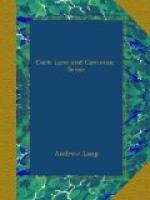Once more, Rome in the late Republic, the Rome of Cicero, was ‘enlightened,’ as was the Greece of Lucian; that is the educated classes were enlightened. Yet Lucretius, writing only for the educated classes, feels obliged to combat the belief in ghosts and the kind of Calvinism which, but for his poem, we should not know to have been widely prevalent. Lucian, too, mocks frequently at educated belief in just such minor and useless miracles as we are considering, but then Lucian lived in an age of cataclysm in religion. Looking back on history we find that most of historical time has either been covered with dark ignorance, among savages, among the populace, or in all classes; or, on the other hand, has been marked by enlightenment, which has produced, or accompanied, religious or irreligious crises. Now religious and irreligious crises both tend to beget belief in abnormal occurrences. Religion welcomes them as miracles divine or diabolical. Scepticism produces a reaction, and ‘where no gods are spectres walk’. Thus men cannot, or, so far, men have not been able to escape from the conditions in which marvels flourish. If we are savages, then Vuis and Brewin beset the forest paths and knock in the lacustrine dwelling perched like a nest on reeds above the water; tornaks rout in the Eskimo hut, in the open wood, in the gunyeh, in the Medicine Lodge. If we are European peasants, we hear the Brownie at work, and see the fairies dance in their grassy ring. If we are devoutly Catholic we behold saints floating in mid-air, or we lay down our maladies and leave our crutches at Lourdes. If we are personally religious, and pass days in prayer, we hear voices like Bunyan; see visions like the brave Colonel Gardiner or like Pascal; walk environed by an atmosphere of light, like the seers in Iamblichus, and like a very savoury Covenanting Christian. We are attended by a virtuous sprite who raps and moves tables as was a pious man mentioned by Bodin and a minister cited by Wodrow. We work miracles and prophesy, like Mr. Blair of St. Andrews (1639-1662); we are clairvoyant, like Mr. Cameron, minister of Lochend, or Loch-Head, in Kintyre (1679). If we are dissolute, and irreligious like Lord Lyttelton, or like Middleton, that enemy of Covenanters, we see ghosts, as they did, and have premonitions. If we live in a time of witty scepticism, we take to the magnetism of Mesmer. If we exist in a period of learned and scientific scepticism, and are ourselves trained observers, we may still watch the beliefs of Mr. Wallace and the experiments witnessed by Mr. Crookes and Dr. Huggins.




